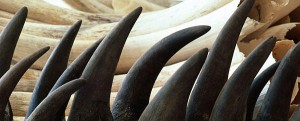 At the time, Maputo police spokesperson Orlando Madumane announced the seizure of 4.5 kilos of rhino horns and large sums of foreign currency from four men. He said two of them were Mozambicans and the other two were from South Korea.
At the time, Maputo police spokesperson Orlando Madumane announced the seizure of 4.5 kilos of rhino horns and large sums of foreign currency from four men. He said two of them were Mozambicans and the other two were from South Korea.
The men were arrested on 3 May, but later in the month the UPI news agency correctly identified them as North Koreans. Citing Mudumane, the agency said they were released on bail of 30,000 US dollars. Once released, they drove into South Africa. In addition to the horns, they were carrying 99,200 US dollars in cash.
The new report, entitled “Diplomats and Deceit: North Korea’s Criminal Activities in Africa”, is published by the Global Initiative against Transnational Organised Crime, and written by South African investigative journalist Julian Rademeyer.
One of the two men arrested in Maputo in 2015 was Pak Chul-jun, the political counselor at the North Korean embassy in Pretoria. The other, Kim Jong-su, is a master in the martial art of Taekwondu, but is believed to be a North Korean spy.
According to the report, the two were only released after intervention by the North Korean ambassador in Pretoria. In November 2016, the South African foreign ministry told Pak to leave the country within 30 days or be declared persona non grata. He left on 11 November. Kim left South Africa a month or two earlier and has not returned.
From analyzing press reports and other publicly available information, the report concludes that out of 29 cases of ivory and rhino horn smuggling in southern Africa involving diplomats, in 18 of them the diplomats involved were North Korean.
Interviews with law enforcement, diplomatic and government officials in southern Africa and South Korea, plus North Korean defectors now living in the south, lead the report to conclude that “a number of North Korea’s African embassies form a nexus of illicit trade in rhino horn, ivory, cigarettes and minerals”.
One of these defectors, Park Ji-wan, recalled that when the regime sent him to set up a freight company in China, he met North Korean diplomats who “would come from Africa carrying rhino horn, ivory and gold nuggets…They would fly to Beijing and meet directly with Chinese smugglers or I would arrange it and we would it exchange it into hard currency. Ivory and gold came mostly from Congo. There was also ivory from Angola and a lot of rhino horn from South Africa and Mozambique”.
“They were making cash off the horn and ivory in China and maybe one per cent of the rhino horns went to North Korea”, he said.
The diplomat arrested in Mozambique, and later asked to leave South Africa, Pak Chol-jun, was a regular visitor to Beijing from 2011, the defector claimed. He was reputedly “number one in smuggling in South Africa”.
Park described the North Korean embassy in Pretoria as a key supplier of rhino horn. He put the price of rhino horn at the time as 35,000 dollars a kilo.
A North Korean biophysicist who escaped from the country in 2009 said that rhino horn “is very popular with affluent people in North Korea and most people believe it cures a certain type of cancer”. Because of the huge cost, he added, “It is sold by the gram”.
The report concludes that “North Korea has a long history of involvement in criminal activity. Its smuggling networks, front companies and state-sponsored criminal actors are sophisticated, efficient and adept at circumventing sanctions, laws and regulations”.
Post published in: Africa News

